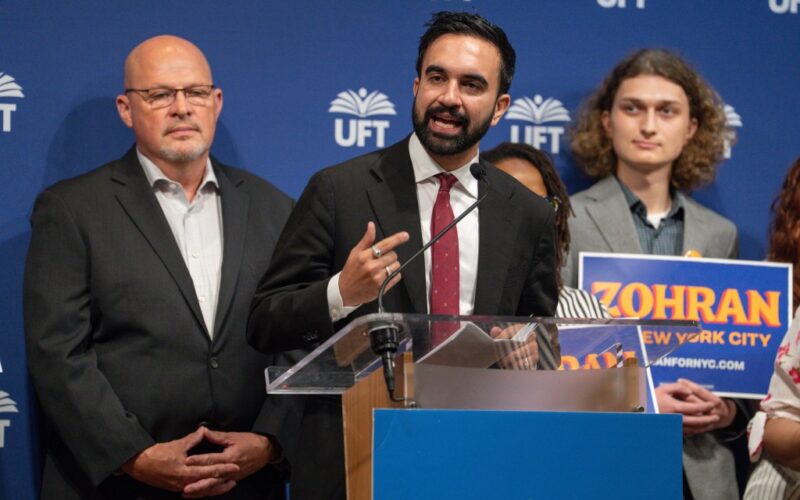While the other major candidates for mayor are on record favoring the current system of mayoral control of schools, Democratic nominee Zohran Mamdani is in opposition. He needs to clarify what this means.
Mamdani has a thin record on public education. He attended private school through eighth grade, then the elite Bronx High School of Science before graduating from a private college. He doesn’t sit on the Assembly’s Education Committee, a favored post among elected officials because of its importance and high visibility. Direct involvement with schools in his Queens district appears scant. He didn’t take part in the brief teachers union initiative for Democratic primary candidates to work a day in a city public school.
Most importantly, pre-K through 12 education hardly figures in his list of campaign priorities: a rent freeze, free buses, government-owned grocery stores, and community safety.
The closest he comes to addressing education on his Zohran for NYC homepage is an on-brand promise of free child care. Only by drilling down three levels is there a generic schools position, hardly distinguishable from other candidates’, that “Zohran will ensure our public schools are fully funded with equally distributed resources, strong after-school programs, mental health counselors and nurses, compliant and effective class sizes, and integrated student bodies.”
So what are we to make of Mamdani’s stance on public education which accounts for one third of the city’s budget and its largest single expenditure, responsible for educating almost a million students?
He has been all but silent on the needs of low-income students, those with home insecurity, students with disabilities, and multilingual learners. How will he address the state’s new cell phone ban, the Supreme Court’s allowance of parent opt-outs from religiously objectionable curriculum, or the massive and myriad funding holes created by federal budget cuts to instruction, school meals, and health care?
These are not matters to be wished away by his single creative education proposal: ending mayoral control of the schools.
It’s this dramatic idea that distinguishes Mamdani from his primary and general election opponents so it’s worth gaining a better understanding of what he means when he promises “an end to mayoral control and envisions a system instead in which parents, students, educators and administrators work together to create the school environments in which students and families will best thrive — strengthening co-governance through the PEP, SLTs, DLTs, and CECs in particular.”
His premise ignores an important fact. Like many of his other more ballyhooed proposals, Mamdani is not the master of his fate on school governance. Mayoral control is a state law so it’s unlikely that major changes will be enacted unless the Legislature and governor so fear a Mamdani mayoralty that they change the law. Like it or not, on Inauguration Day the mayor will probably be responsible for New York’s public schools.
But Mamdani may not need statutory change to enact his vision. I don’t take his proposal as seeking to end the mayor’s role in education, just an end to the current model of strong mayoral control. Key powers over the schools such as city budget allocations and collective bargaining exist under the City Charter, not the mayoral control law.
What he seems to be suggesting is stepping away from educational policymaking, a role previously embraced by mayoral control era leaders who became closely identified with their school initiatives: Mike Bloomberg (closing large schools and opening smaller ones), Bill de Blasio (pre-K), and Eric Adams (reading instruction). Perhaps, somewhat ironically, ending strong mayoral control may become Mamdani’s chief educational accomplishment.
Mamdanian co-governance might take different forms. It could mean nothing — the bodies his website mentions as co-governing partners already exist and one can imagine him appropriating current practices of consultation with those largely toothless bodies under a banner of co-governance.
But the exciting news is that it could mean something. School-based management, devolving decision-making to principals, teachers, and parents, is an old saw in the leadership toolbox. Even Bloomberg tried it but his penchant for micro-managing through quantitative measures and punitive accountability created top-down priorities tying the hands of all but the most forceful principals.
Key to the Mamdanian vision would be a system based on quasi-independent principals (the school system has 1,700!), committed and able to lead collaboratively with unionized school staff and often contentious, always changing parent bodies. A cohort of like-minded community school district superintendents and other senior supervisors would support principals while largely stepping aside from directing their actions even when they disagree with specific school decisions.
An Achilles heel of co-governance is that even those favoring the practice in theory can become its opponents if they don’t get their way. There will be pressure on Mamdani or his chosen chancellor to be the chief decider.
But the system is sabotaged if leadership is prone to overruling subordinates, pressured by appeals supported by advocacy groups, elected officials or the press. When these protests occur, how would a Mayor Mamdani respond if a school or district opposed curriculum or practices that excluded members and allies of the LBGTQ community? Would legitimate policy concerns ignore principles of co-governance and, if so, what becomes of his collaborative model? Put another way, wouldn’t that be mayoral control?
Another series of questions to address if the mayor steps aside from active governance is who would then be in charge? Would Mamdani still exercise unilateral appointment of the chancellor? This would hardly be an act of co-governance but what process would be installed in its place?
Similarly, the Panel for Education Policy (PEP), the city’s Board of Education, currently has a built-in majority of mayoral appointees. Would Mamdani open up these positions to some he disagrees with? Or replace the appointment process entirely? With what? And who would appoint community school district (CSD) superintendents or run community school board elections?
And while we’re at it, who would elect those boards since, with greater powers, the current structure of PEP appointments and low-turnout, parent-only CSD elections may not survive one-person-one vote challenges. These are public schools: taxation without representation by all regularly eligible voters is anathema to our founding principles.
Ultimately, we have a school system with operational demands of huge proportions and complexity affecting the multiplicity of Mamdani’s co-governors.
There are school meals to be planned, prepared, and delivered; school buses to run safely and on time; specially licensed and unlicensed personnel to be hired, fired, and paid; research for new curricula and teaching improvement; myriad laws to be followed and monitored; controversies to be addressed in and out of court; student enrollments matched to school capacities and attendance zones.
There are also aging buildings requiring cleaning and maintenance, along with new buildings to be planned and built; safety personnel trained and ready to keep order; implementation of absenteeism and student discipline protocols; allocating school funds from a tangle of designated federal, state, and local sources; school calendars and snow days to be declared; new technologies evaluated and adopted.
And all of this and more tied to the city’s interwoven threads of diversity of geography, languages, specialized student needs, and political interests.
Co-governance is a great concept to campaign on. Keeping the schools running and making them more effective in an era of dwindling finances under any governance model will be the challenge. The open question is what will Mamdani do?
Bloomfield is professor of education leadership, law, and policy at Brooklyn College and The CUNY Graduate Center.








